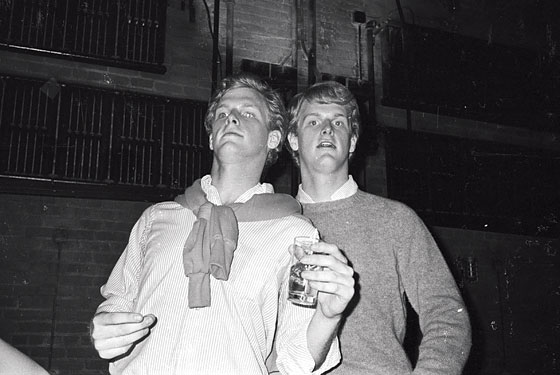 |
Richard and Robert Dupont, Connecticut boys ready to party.
(Photo: Anton Perich) |
As told to Michael Joseph Gross
“Martha did these gift baskets with, like, cookies and tea and stuff. And I said, ‘Could you make up one for Valentine’s Day for Andy?’
“She said, ‘Who’s Andy?’
“I said, ‘Andy Warhol.’
“She said, ‘He’s too old for you!’ And then she said, ‘Oh, I want to meet him!’ She brought the basket all the way down to New York herself, and she came to the Factory, and I introduced them, and they talked about Connecticut.”
—Richard Dupont
In 1977, in Westport, Connecticut, a pair of 17-year-old identical twins worked for a caterer named Martha Stewart. Tall, blond, and eager, Richard and Robert Lasko were high-school juniors who were adopted at birth by a couple who owned gas stations in Fairfield County. Their father left when the boys were in fifth grade, and aside from the occasional threat to “send them back to the orphanage,” their mother focused all her energy on finding a new man.
These were fast times, and they were fast kids. As teenagers, both of the twins experimented with drugs and sex, and wanted more of just about everything. One spring night, after working a Stewart-catered party in Manhattan, another of her employees took Richard and Robert to a new club called Studio 54. They found a world of excess even more immense than their appetites, and by autumn, the Laskos had run away from home, renamed themselves the Dupont twins, and become pets of café society. New York’s art crowd has never misbehaved more spectacularly than it did at Studio, and it didn’t take the boys long to find, at the center of the vortex, a new friend in the 48-year-old Andy Warhol. In their telling, the artist was both kind-hearted and grotesque, with Warhol and his set at their most predatory.
The twins, now 47 and sober, work as reporters for the social magazine Beverly Hills 213. Recently, in several interviews at the apartment they share in Beverly Hills, they recalled their lurid romp through New York’s last shameless binge of money, sex, and art.
Robert: I think we got into Studio 54 that first night because we were wearing the tails left over from catering the party. We had brought a 14-year-old boy from school with us, which made us the youngest people there, so everyone wanted to give us things and dance with us. I remember the smell: Halston Z-14 cologne, flowers, and poppers.
Richard: Hours went by, and we were having a great time. Someone offered us cocaine, which we had tried in Connecticut but felt completely new in New York. We lost our friend the minute we got there, but when we walked onto the dance floor, it felt like we had found a new piece of home. Our friend eventually found us hours later, and he was, like, “We all have to go to school tomorrow!” We didn’t get home until five in the morning. Oh my God. Martha called the next day because that boy’s parents were furious. She was concerned.
But over the next few weeks, Studio 54 became our lives. It felt so much more right than anything we had seen in Fairfield. And the people we met invited us into their family. I remember asking one of Steve Rubell’s assistants how many people were at the club, thinking there were three or four hundred. I couldn’t believe it when she told me there were over a thousand. It felt like we were family in Steve Rubell’s living room.
Robert: The third time we went, I met this guy named Rupert Smith. He came up to me at the main bar and offered me some cocaine, and then he invited me up to the balcony, all the way to the top. And then we had sex right there at Studio—I was nervous, but Rupert was really sweet about it. Afterwards, I said I was still in school working for this caterer, and he said he worked as a silk-screener for an artist named Andy Warhol. He asked if I had any brothers and sisters—you know, the usual conversation—and when I told him about Richard, he said, “Oh, you’re a twin? Andy loves twins.”
We went home to Rupert’s place, and at ten the next morning Rupert took me to the Factory. Paloma Picasso was there. When Andy came out and said, “You must be Robert,” I thought it was so nice that Rupert had called to say he was bringing me.
“When am I going to meet your twin brother?” was the first thing Andy asked.
Then he showed me some portraits he was doing, as if he was trying to get me to buy one. That was funny. Like I could afford one.
When we left, I called Richard and told him I would stay in New York for a while. I didn’t go back. And that’s why I got incompletes at school.
